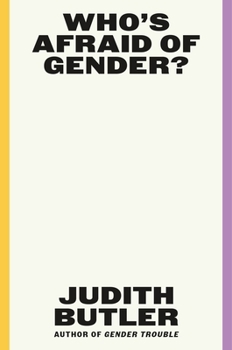 WHO’S AFRAID OF GENDER?
WHO’S AFRAID OF GENDER?
by Judith Butler
Farrar, Straus and Giroux
320 pages, $30.
IN THE INTRODUCTION to her new book, Judith Butler recalls an encounter with a woman she met after giving a talk in Switzerland. The woman approached Butler and told her that she “prays for her.” Butler is in need of prayer because, through her books, she has “denied scripture.” Reports Butler: “I then asked if she had read my work, and she replied, ‘No! I would never read such a book!’ It was at that point I realized that reading a book on gender would be, for her, trafficking with the devil.”
In Who’s Afraid of Gender? Judith Butler interrogates how discussing gender came to represent the ultimate evil in the minds of some religious leaders, pundits, and politicians on the political Right. She posits that, for them, gender has become a “phantasm.” The fears and uncertainties the average person has about such issues as economic uncertainty and the planet’s future are turned away from the real causes for these social problems in favor of the catch-all category of “gender” or “gender ideology”—concepts that they cannot clearly define, like “Critical Race Theory” or “woke,” but which serve their ideological purpose. Comments Butler: “Let us remember that certain words are being imagined as so powerful that only through censorship is there any hope of depriving them of their power.”
Judith Butler herself, as the author of such groundbreaking works as Gender Trouble: Feminism and the Subversion of Identity (2006) and Bodies That Matter: On the Discursive Limits of “Sex” (2015), is a target as well: “I have found my name circulating in ways I can barely understand, and part of the motivation for this book has been to try to fathom how one’s arguments become distorted phantasms.”
Butler begins Who’s Afraid of Gender? with an overview of global “anti-gender” efforts by conservative religious figures and groups from Evangelical pastor Scott Lively’s work in Africa and Spain’s CitizenGo to authoritarian-minded politicians like Hungarian Prime Minister Viktor Orbán, who has called “gender ideology” a threat to the nation itself. Next, she narrows her focus to consider the position of the Vatican and the Catholic Church, which holds that anyone who questions the “natural order” of male and female is contravening God’s authority and replacing it with their own. This “critique” of gender, which regards any discussion of the topic to be destructive to the person and the family, has also been amplified by Pope Francis, notwithstanding his relatively tolerant position on same-sex relationships.
 Who’s Afraid of Gender? moves from a consideration of the Supreme Court’s somewhat surprising 2020 decision in Bostock v. Clayton County, which held that Title VII of the Civil Rights Act of 1964 protects employees against discrimination based on their sexuality or gender identity, to a critique of “gender-critical” trans-exclusionary radical feminists (TERFs) in the United Kingdom. She then considers such topics as gender as a co-construction of both “nature” and “culture” and the impact of colonialism on the Global South through the enforcement of a gender binary that erased the social complexities of these cultures prior to the arrival of Europeans. Butler also explores how gender is considered a “foreign” term in much of the world and issues of translating English words and concepts into other languages, as well as such “hot button” issues as the role of sex and biology in the construction of gender and trans women in sports.
Who’s Afraid of Gender? moves from a consideration of the Supreme Court’s somewhat surprising 2020 decision in Bostock v. Clayton County, which held that Title VII of the Civil Rights Act of 1964 protects employees against discrimination based on their sexuality or gender identity, to a critique of “gender-critical” trans-exclusionary radical feminists (TERFs) in the United Kingdom. She then considers such topics as gender as a co-construction of both “nature” and “culture” and the impact of colonialism on the Global South through the enforcement of a gender binary that erased the social complexities of these cultures prior to the arrival of Europeans. Butler also explores how gender is considered a “foreign” term in much of the world and issues of translating English words and concepts into other languages, as well as such “hot button” issues as the role of sex and biology in the construction of gender and trans women in sports.
A thought-provoking and (perhaps surprisingly) highly readable book, some of Butler’s points and explications in Who’s Afraid of Gender? are repetitive, as if the final text had been crafted from various speeches or articles. A shaper editorial eye would have caught such bloopers as the appearance of an entire paragraph on one page and its re-appearance verbatim a few pages later.
In her conclusion, Butler declares that “[t]hose who fear gender know that it also holds out a promise of freedom.” Fighting against those forces will not be easy, a literal life-and-death struggle, and she urges the creation of broad coalitions to wage that battle, regardless of how awkward that may be for some people: “[W]e have to create a struggle across differences that keeps the source of oppression in focus. … We cannot oppose discrimination against ourselves only to support it for others.” Butler urges readers to make “desire desirable again in such a way that people want to live, and want others to live, in a world we envision, where gender and desire belong to what we mean by freedom and equality.” The only way to act against those who fear “gender” as they’ve come to define it is with an opposing, more inclusive worldview:
It is up to us to produce a compelling counter-vision, one that would affirm the rights and freedoms of embodied life that we can, and should, protect. For in the end, defeating this phantasm is a matter of affirming how one loves, how one lives in one’s body, the right to exist in the world without fear of violence or discrimination, to breathe, to move, to live. Why wouldn’t we want all people to have those fundamental freedoms?
Reginald Harris is a writer and poet based in Brooklyn.





